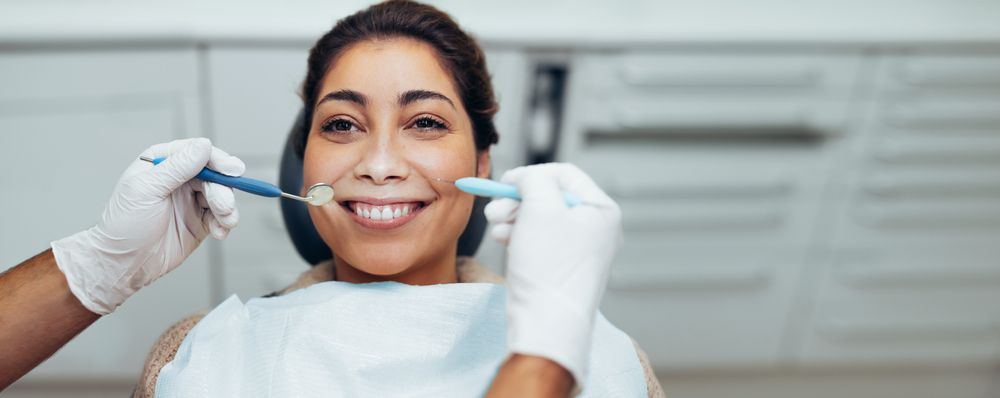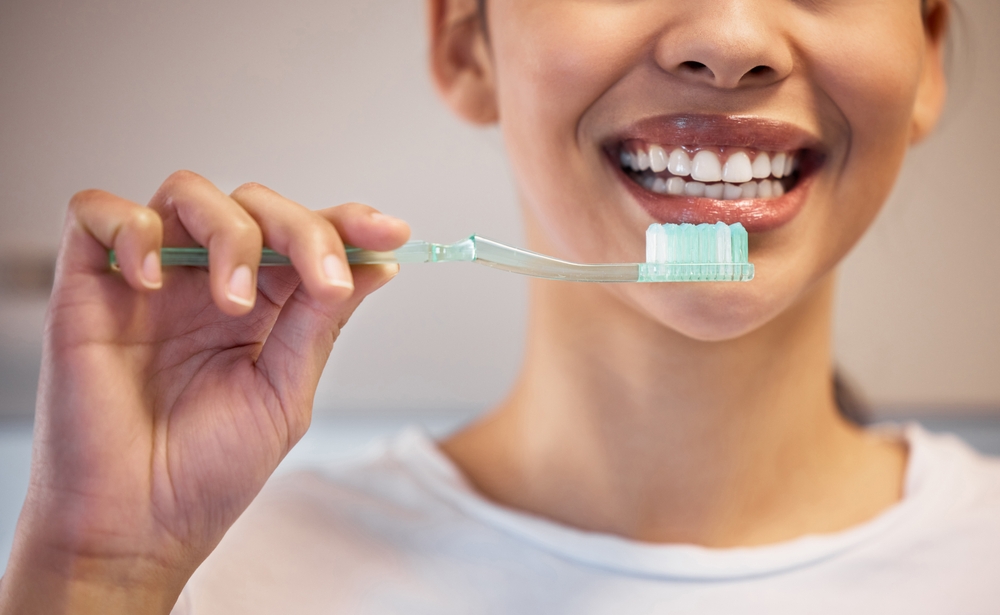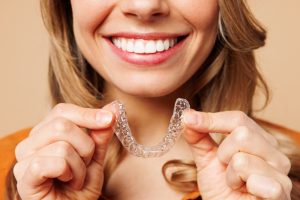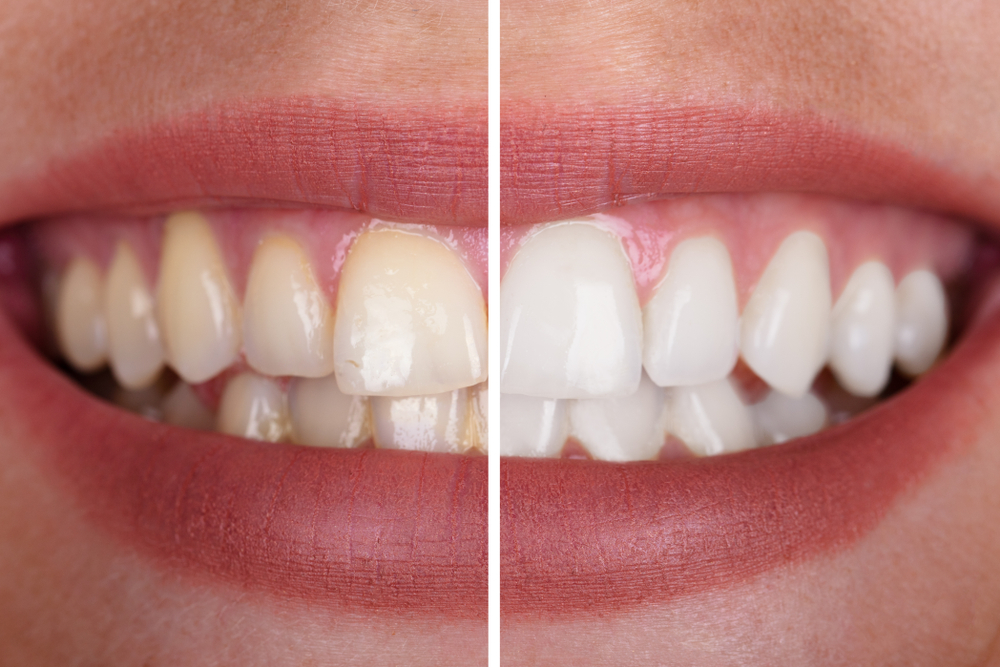We want you to have the brightest smile possible for your best quality of life, health, and confidence. You can maintain your healthy smile with preventative dental care, both at home and when you visit our office.
Preventative dental care means taking care of your teeth, gums, and mouth to preserve their optimal health and prevent potential issues later. It all starts with daily maintenance for your teeth at home so you can enjoy a lifetime of beautiful smiles.
Continue reading to learn more from Parkcrest Dental Group.
Table of Contents
Why Is Preventative Dental Care So Important?
Preventative dental care can keep your teeth strong and healthy while reducing the risk of painful and costly dental problems. Daily toothbrushing and flossing at home, as well as regular professional cleanings with your dentist every six months, remove plaque buildup. The goal is to minimize cavities and gum disease. Consistent oral hygiene and regular checkups can preserve your teeth for a lifetime.
Routine visits to your dentist can detect potential issues early. Small cavities or signs of gum inflammation receive immediate attention before they worsen. Early detection often leads to simpler, less invasive, and less expensive treatments, saving our patients both time and discomfort in the future. Routine checkups and cleanings cost significantly less and might cause less discomfort than fillings, crowns, or dental implants.
Good preventative dental care also contributes to overall health. Patients could have better nutrition, less strain on their immune system, and fewer chances of mouth infections spreading to the rest of the body. A healthy mouth often reflects a healthy body.
Education also plays a key role in preventative care. Dentists, dental assistants, and hygienists on our staff provide guidance on proper brushing and flossing techniques while recommending tools tailored to specific needs. For example, if you have mobility issues with your hands, we might recommend an electric toothbrush and floss picks rather than traditional manual toothbrushes and dental floss.
We help patients understand the connection between diet and oral health, emphasizing the effects of sugar and acidic foods. We want you to have the best smile and best health possible.
Routine Dental Exams & Cleanings
Professional cleanings at the dentist can remove plaque and tartar buildup that regular brushing and flossing cannot eliminate. Plaque is a thin, sticky, colorless film that can lead to cavities and gum disease if you don’t brush away the plaque. Tartar is harder than plaque, and it’s caused by plaque buildup. It can’t be easily removed with a toothbrush. Our dental hygienists can clean off the tartar with our dental tools to reduce the risk of cavities, tooth decay, and gum disease.
During a dental exam, the dentist will carefully inspect your teeth, gums, and mouth to see the current condition of your oral health. If there are any signs of small cavities, enamel erosion, or gum inflammation, your dentist will recommend a treatment option and a follow-up appointment.
Another aspect of regular checkups is understanding your dental health history. Your dentist will compare current and past exams to identify patterns or recurring issues that may indicate underlying concerns. The goal is to develop a comprehensive care plan to reduce the likelihood of long-term damage or chronic oral health conditions.
Another aspect of preventative care is that you can talk to us about your concerns and dental care goals. Our dentists and hygienists can provide personalized advice on brushing, flossing, and using products like fluoride toothpaste or interdental brushes.
Sealants & Fluoride Treatments
Dental sealants and fluoride treatments are designed to protect teeth and prevent cavities. They are regular parts of preventative dental care.
Dental Sealants
Sealants create a physical barrier on teeth that prevents food particles and bacteria, particularly on the chewing surfaces of molars, where decay often begins. Dental sealants work best when applied to teeth early, often during childhood, but they also benefit adults.
Dentists clean and dry the tooth before painting on the sealant so that the bond is strong. Sealants provide long-lasting protection and can reduce the risk of decay. Sealants prevent cavities before they form, avoiding the need for future fillings or restorations.
Fluoride Treatments
Fluoride strengthens enamel, making teeth more resistant to acid attacks from plaque and sugar. The reason is that fluoride is close in chemical composition to calcium.
Dentists apply fluoride in various forms, such as gel, varnish, or foam, depending on which suits your needs. Fluoride treatments provide extra defense for individuals at higher risk of decay, such as those with a history of cavities or wearing braces.
Fluoride treatments complement sealants by reinforcing the enamel across all tooth surfaces. When used together, dental sealants and fluoride treatments can help improve your oral health. They serve as a supplement to brushing and flossing.
Oral Hygiene at Home
Preventative dental care starts at home. Brushing and flossing regularly remove plaque and food particles on teeth, reducing the risk of cavities and gum disease. A solid at-home oral care routine can help you have healthier teeth and gums, while professional cleaning complements your at-home routine.
Brushing twice daily with fluoride toothpaste effectively cleans the surfaces of the teeth. Using a soft-bristled toothbrush and proper technique prevents damage to enamel and gums. We recommend brushing for at least two minutes to ensure thorough cleaning, focusing on all areas of the mouth, including hard-to-reach spots.
Flossing plays an equally important role in oral hygiene by cleaning between the teeth and along the gumline. Dental floss or interdental brushes remove debris and plaque where toothbrushes cannot reach. Daily flossing reduces the likelihood of gum inflammation and prevents the formation of cavities in these vulnerable areas.
In addition to brushing and flossing, we recommend adding an antibacterial mouthwash to your regular oral hygiene routine. Rinsing with mouthwash helps kill bacteria, freshens breath, and provides an extra layer of protection against plaque buildup.
Drinking water throughout the day also supports oral health by washing away food particles and neutralizing acids that weaken enamel. Proper nutrition can also make your teeth stronger.
Oral Hygiene Products
In addition to soft-bristled toothbrushes, dental floss, and mouthwash, we also recommend other oral hygiene products to use at home, depending on your needs. We also have professional-strength solutions available at our office for you to take home and use.
Electric toothbrushes provide enhanced cleaning, especially for people with mobility issues, using technology that moves a toothbrush back and forth very quickly for a thorough cleaning.
Water flossers use a pressurized stream of water to clean between teeth and along the gumline. This is also outstanding for people with mobility issues, such as arthritis in the hands.
Interdental brushes are small brushes designed to clean between teeth, especially for those with larger gaps or braces.
Tongue scrapers remove bacteria and debris from the tongue, reducing bad breath.
Fluoride varnishes or gels strengthen enamel and help prevent cavities, particularly for individuals with a high risk of tooth decay. We can teach you how to use these items properly.
Whitening strips or trays improve the appearance of teeth by removing surface stains. We also offer professional-strength tooth whitening kits to use at home.
Enamel repair toothpaste targets early signs of enamel erosion and strengthens weakened areas. This might also be called remineralizing toothpaste.
Sensitive toothpaste is formulated to reduce discomfort in individuals with sensitivity to hot, cold, or sweet foods.
Orthodontic wax protects the mouth from irritation caused by braces or other dental appliances.
Orthodontic floss threaders make flossing easier for individuals with braces or other dental appliances.
Chewing gum with xylitol promotes saliva production and reduces cavity-causing bacteria. Xylitol is a sweetener that serves as a sugar substitute.
Probiotics for oral health support a balanced oral microbiome and help manage bad breath or gum issues.
Nightguards or mouthguards prevent grinding, clenching, or tooth damage during sleep or sports.
Plaque-disclosing tablets highlight areas where plaque remains after brushing for improved cleaning habits.
Talk to us about your oral hygiene routine, and we can recommend ways to improve your daily routine.
Nutrition & What Foods to Eat for Strong Oral Health
Proper nutrition and eating habits support healthy teeth by providing essential vitamins and minerals that fortify teeth and gums.
Vitamins & Minerals
Calcium-rich foods like milk, cheese, and yogurt strengthen enamel and maintain bone density in the jaw. Leafy greens such as kale and spinach supply additional calcium while offering vitamins A and C, which promote gum health.
Vitamin D, found in fatty fish like salmon and mackerel, plays a crucial role in absorbing calcium and phosphorus. Your teeth need both calcium and phosphorus to stay strong. Eggs and fortified foods such as orange juice also provide significant amounts of vitamin D.
Foods That Enhance Oral Health
Crunchy fruits and vegetables, including apples, carrots, and celery, improve oral health by stimulating saliva production. Saliva neutralizes harmful acids and washes away food particles, reducing the risk of cavities. The natural texture of these foods gently scrubs teeth, contributing to cleaner enamel on the outer surfaces of your teeth.
Foods high in antioxidants, like berries, nuts, and green tea, protect gums from inflammation and bacterial damage. These nutrients combat oxidative stress, which contributes to gum disease.
Foods to Avoid
Limiting sugar and acidic foods prevents enamel erosion and cavities. Sugary snacks feed harmful bacteria, leading to plaque buildup. Acidic foods and beverages, like soda and wine, may weaken tooth enamel. Replacing sugary treats with options like fresh fruit or nuts helps maintain a healthy balance in your mouth.
Our team can make recommendations about what foods to eat based on your oral health history and the current state of your mouth. For example, certain dental treatments might need slight alterations to your diet, such as avoiding popcorn with braces or eating soft foods after oral surgery.
Make an Appointment at Parkcrest Dental Group
If you’re ready for your next dental checkup, we’re glad to help. Please call (417) 887-1220 or fill out our contact form to make an appointment.







